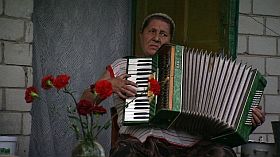


DOK Leipzig Highlights

As advisor for the festival (that starts on monday the 29th), when it comes to films from the Baltic countries I was happy this morning to see that the festival on their site put a focus on 9 films with two of them being from the region that I know and like much:
The Documentarian (photo) by Ivars Zviedris and Inese Klava from Latvia and Ub Lama by Egle Vertelyte from Lithuania. Here follows the description of the film from the site, signed by members of the festival’s selection committee:
The Documentarian: Dziga Vertov himself regarded “life caught in the act”, “life as it is” as the ultimate goal of the documentary. He and his kinoki used every means, even hidden cameras, and no one got mad because the cinematograph was a sensation people wanted to be part of. Almost 100 years later, the two young directors Ivars Zviedris and Inese Kļava take their camera to the moorlands of Kemeri near Riga to explore the life of a hillbilly named Inta. This rustic eccentric with the impressive voice may not own a TV set, but she knows the rules of mass media (including the nuances separating docu-soap and reality show) only too well, especially concerning her worth and rights with regard to the “paparazzi”. She takes command from the start, showering directors, cameramen and producers with curses whose violence makes ordinary mortals blush. Inta says things like “You’re shitting into my soul, you fucking bastard, with your damned camera!” and is not averse to taking up a metal stick to “smash Ivar’s head” or hand him to the “pederasts”. She won’t accept money, but those who “get rich on her poverty” ought to pay nonetheless. Later she’ll cry… while the film has long since become a tragicomic relationship movie, like a meta-commentary about the “documentarian’s” existence in the age of radical moral abandonment. (aka: authenticity).
– Barbara Wurm
UB Lama: A boy like many others of his age: Galaa (12) is a smart, pudgy little rascal who’s not overly fond of school. He prefers to hang out with his little brother (6), listen to hip hop music, watch wrestling on television or eat junk food and play at online dating. The latter is only a fantasy, though, for Galaa lives with his mother and little brother in a yurt settlement on the edge of Ulan Bator (without a computer, of course). For the family – his father died in an accident a few years ago – every new day is a balancing act of survival, for what they earn as ambulant petty traders on the market is barely enough to buy food. So enrolling the boy in a Buddhist monastery school is less a matter of vocation than of existential self-defence. It would be a relief for the family if he was accepted and Galaa himself would be offered a real future perspective. The boy soon realises that this thing would not be bad for him at all and acquires a taste for the whole ceremonial order of Buddhist monasticism with its drums, prayer mills, colourful clothes and bags. A charmingly light and fascinatingly profound documentary coming-of-age story deftly balanced between materialism and spiritualism and – last but not least –fuelled by a heart-rending sense of humour.
– Ralph Eue